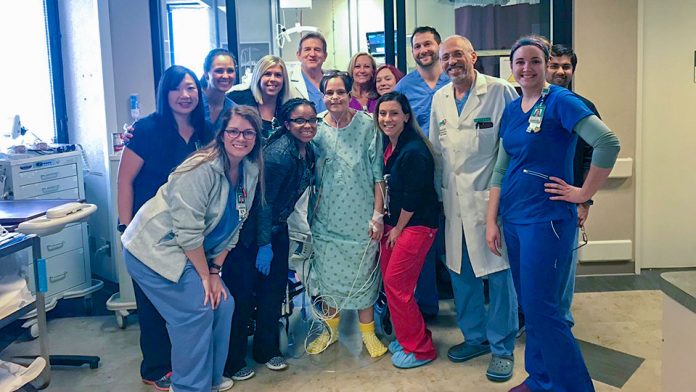How the Team at INTEGRIS Saved Her Life
In February of this year, 40-year-old Adrianne Ayers, a single mom raising three teenagers by herself, began to feel ill. As a registered nurse, she self-diagnosed it as the flu. “I was tired, achy, had a fever,” she recalls. “All the usual flu symptoms.” But in typical mom-fashion, she pushed through, thinking the virus would simply run its course. After all, Ayers was in the best shape of her life. She had recently lost 100 pounds and was eating well and exercising regularly. “I never got sick, I thought this was something that would pass.”
After a couple more days of feeling lousy, Ayers went to an urgent care clinic where it was confirmed that she did indeed have the flu. She spent the next couple of days in bed with no improvement. Until finally things got so bad, that her then 16-year-old son called 911.
She was taken to St. Anthony Hospital where she worked. There, it was discovered that she not only had the flu, but pneumonia and strep-throat as well. It was a nasty combination with near fatal consequences. “I was unconscious at this point so I don’t remember any of it, but I was told that on top of everything I also had a flesh-eating type of MRSA that was attacking my lungs,” says Ayers. “In fact, they were shutting down, so were my heart and my kidneys. My doctor at St. Anthony’s knew that extracorporeal membrane oxygenation, known as ECMO, was my only hope.” Ayers was transferred to INTEGRIS Baptist Medical Center to receive the last resort lifesaving technique.
ECMO provides both cardiac and respiratory support to patients whose heart and/or lungs are so severely diseased or damaged that they can no longer serve their function; perhaps after a heart attack, cardiac surgery, pulmonary embolism, near drowning or lung-related issues such as flu or pneumonia.
The therapy continually pumps blood from the patient via a tube inserted into the groin vessels or neck vein. The blood is pumped through an artificial lung that imitates the gas exchange process of the lung, removing carbon dioxide and adding oxygen, before returning the blood to the patient. The goal is to allow the heart or lungs to rest and recover while the machine does all the work. When the heart or the lungs have healed and can work on their own, the lifesaving support of the ECMO artificial heart/lung machine is weaned then removed.
“In Adrianne’s case, this took longer than most,” says Michael Harper, M.D., with the Advanced Critical Care and Acute Circulatory Support team at INTEGRIS. “She was dependent on ECMO for 119 days, whereas a typical patient is usually on this therapy for 10 to 14 days. To date, she holds the record for being on ECMO the longest of any of our patients.”
But Dr. Harper says things got worse for Ayers, before they got better. “She was in really bad shape. An army of machines were keeping her alive. She was on ECMO, she was on a ventilator, she was on dialysis. There was even talk of transplantation. We thought at one point she may need combined lung and kidney transplantation.”
Ayers was sedated and unconscious for most of this, but remembers coming to, in April. “I got sick in February and now I wake up in the hospital hooked up to all these machines and they tell me it is April. I was terrified. I mean, I’m a nurse and I had never even heard of ECMO and now I was on it. I trusted the nurses and doctors, but I was scared of the unknown.”
Ayers required extensive multi-disciplinary care and truly innovative thinking. She was enrolled in the ATHOS 3 Expanded Access Protocol for Giapreza clinical trial and was one of only 10 patients in the world to have received the therapy while on ECMO at the time. She also benefitted from an off-label use of the Olympus Spiration endobronchial valve, a device no physicians in the Oklahoma City metro area had experience with until now. As a result of this unique combination of medical modalities, Ayers’ condition began to improve.
“Her hospital stay was long and undoubtedly expensive, but she will survive to raise her three children,” declares Harper. “I can honestly say that no other hospital in this region, and in most places in the United States, could have provided all that she required. I am proud to have been a part of it and to be at a center that is able to offer such high level care.”
Ayers was released from the hospital this July and is back at home with her children. She is on oxygen and is receiving outpatient physical therapy. She says life is slowly returning to normal and she feels stronger every day. She is eternally grateful for the second chance she was given.
“ECMO and medical technology played a role in my survival; the doctors, nurses and support staff played a role in my survival; my children played a role in my survival; prayers from my friends and family played a role in my survival – and of course, God,” concludes Ayers. “I’ve been in health care since 1998 and this was by far the best collective care I’ve ever witnessed. I owe them my life.”

Join Our TEAM Today
$5,000 SIGN ON BONUS FOR FULL-TIME POSITION
We are hiring RNs for
Medical-Surgical – RNs
Emergency – RNs
Applicants should apply at
www.alliancehealthseminole.com













